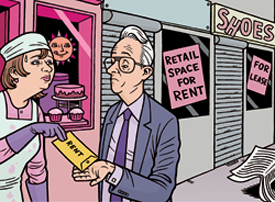HABITAT
Keeping Your Commercial Space Working During the Downturn
May 11, 2009 — At a 220-unit co-op in Manhattan's Murray Hill neighborhood, a commercial tenant has fallen several months behind in rent. The renter received a friendly reminder notice. Then a not-so-friendly reminder notice. Then a friendly letter, followed by a not-so-friendly letter, warning of dire consequences. Complicating matters: The newcomer had taken over the lease from a previous tenant, who had also fallen into arrears.
Now what? Should the building's budget take a monthly hit from the failure of the one tenant to pay rent? When a commercial tenant can't pay the rent, what's a board to do – reduce it, or kick 'em to the curb?
"Either the tenant is going to have to pay us what he owes us or come to us with a plan, or we are going to need to vacate and put someone else in there," declares Sam Milgrim, the board treasurer, who notes that the building has a "wonderful" relationship with the other five of its six commercial tenants. "We are trying to decide at this point whether we are going to encourage them to stay."
While the board is deciding, the stress level is rising among tenants who are paying on time and shareholders who worry about the budget. But Milgrim indicates they may hang tough: "We're not going to give anybody a free ride," he notes. Yet the streets of Manhattan are littered with the results of such threats. Real etate attorney James Samson, a partner at Samson Fink & Dubow, has counted 19 vacant storefronts between 57th and 86th Streets "just on the east side of Madison [Avenue]."
Finding a good commercial tenant can be a tricky proposal even in the best of times: You register with a broker; review prospective tenants; perhaps offer to void the rent while the tenant renovates; and then pay a broker's fee that can run upward of 30 percent of the first year's rent. Even in an up market, a commercial space can sit vacant anywhere from a month to a year while the broker, landlord and tenant negotiate the lease. And in a down market? Don't ask.
These days, says Samson, he's fielding many calls from nervous co-op and condo boards that can't afford to lose their commercial tenants but are upset because rent payments have started to slide or the tenant has is asking for a rent reduction. With everyone feeling the pinch in the recession, what's the wisest course to follow? Here are four guidelines:
1) Reduce
If a long-term tenant has a history of paying on time, it may be worth it to consider a rent reduction. "If the tenant is marginally not making money, you can lower his rent to an acceptable level so the tenant can survive," Samson notes. "What you don't want to do is lower his rent and then have him default." Even worse, you don't want a tenant to come in and complain that he can't make it and then use the rent reduction to earn a bigger profit.
When it comes to deciding whether to negotiate with current tenants or to find a new tenant, management executive Ellen Kornfeld, of the Lovett Group, says that with few tenants able to pay market rates, "The most important thing now is to try and work with your tenant and try to keep them there, making some concession or holding back on [rent] escalations." Today it's more important "to have the tenant than to have a vacant store. It's dangerous when you have a vacant store: You have vandalism [and] bugs and it takes away from the look of a building."
2) Forgive or defer
Consider rent forgiveness or rent deferral. If the board is willing to negotiate a rent reduction, then some key particulars need to be worked out. Will it be a rent forgiveness program or a rent deferral program? And how long will the reduction last? Will it be for six months? A year? Two years? For the balance of the lease? "These are all interesting questions that the board needs to think about before it's too late," warns Samson.
Many leases also have a guarantee that the tenant will pay rent for the remainder of the lease – even if he is no longer in physical possession of the property. This can lead to time-consuming, costly litigation as you try to get money from a tenant who has vacated the premises before his lease is up. You may want to renegotiate the lease so that the tenant is only obligated to pay the rent while he is in possession.




